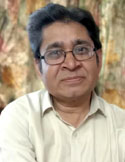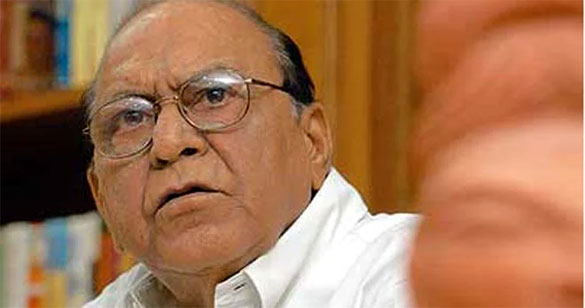Dr Gopichand Narang: Remembering a Colossal Scholar of Urdu in These Fissiparous Times

By
Sumit Paul, New Age Islam
18 June
2022
Dr
Gopichand Narang Will Always Be Known For Reevaluating Classical Poets Like Meer,
Ghalib, Iqbal And Amir Khusrau
Main
Points:
1. Dr Gopichand
Narang will be remembered for many things but also for introducing
postmodernism debate in Urdu.
2. Dr Gopichand
Narang believed that Urdu literature is wedded to the roots.
3. Narang always
appreciated young poets, writers and critics.
-----

Dr Gopichand Narang received a master's degree in Urdu from the
University of Delhi, and a research fellowship from the Ministry of Education
to complete his PhD in 1958.
-----
“Languages
don't need religion; people do."
Late Dr
Gopichand Narang, the legendary Urdu critic and writer
“Zabaan-E-Urdu
Mein Jo Kashish-O-Andaaz Hai Woh Bamushkil Kisi Aur Zabaan Mein Hogi, Lekin
Main Farsi Ki Raanai-O-Latafat Se Bhi Inkaar Nahin Karta...." (The delectability of Urdu is
simply rare in other languages, yet I don't deny the exquisiteness of Persian).
These words
of the legendary Urdu critic and writer Dr Gopichand Narang shall remain etched
in my memory. The just departed legend wrote to me in his cursive Urdu many
years ago. After that, I met him a couple of times in Delhi, London and the US.
In these times, when we're sparring over Urdu as the language of a ' different
' community, Dr Narang's role in uplifting the dying language becomes all the
more significant. He was a true ambassador of Urdu world who once called Urdu, “India’s
linguistic Taj Mahal." “There’re three hallmarks of the Mughal era- The
Taj Mahal, Ghalib's poetry and Urdu.....Although every language is beautiful,
Urdu's sophistication and charm captivate everyone. That's why I call Urdu,
India's linguistic Taj Mahal."
Narang
always made it a point to project and present Urdu as a language of the
subcontinent. He believed that if everyone learnt Urdu, there would be no
communal strife in the country because Urdu was as much a language of the
Hindus as it is of Muslims. It was Narang's recipe for Qaumi Ittihaad (community
consciousness and cordiality).
In modern
India, there have been two great Urdu critics, Shamsur Rahman Faruqi and
Gopichand Narang. They were coevals. Though comparisons are always odious, one
must acknowledge the fact that Narang had greater universality in his approach
and vision. I remember, once he delivered a lecture on Urdu's all-encompassing
nature vis- a- vis other languages at an Ivy League University in the US. He
quoted from Persian, Arabic, Pahalavi, Pashto, English, French and Italian to
buttress his point. The august audience was spellbound. He was a polyglot and
believed that one must learn as many tongues as one can. “Every time you learn
a new language, you get a new soul, “was his unfailing mantra.
It was
Narang who promoted the study of comparative languages in India along with
Nabaneeta Dev Sen. He'd often quote Attar's famous Misra (line) in Pahalavi, “Yaan
Ust Zabaan-E-Munbilam Zee Qaf'at “(let all languages thrive).
It's said
that a critic is seldom an independent writer (Qaa’ Phin Naqqaad Biz
Qalamgeer). But Narang was an exception. He was a fabulous critic and an
equally great writer. His legions of books and innumerable papers in English
and Urdu underline the fact. Because of his compassionate critical insights,
Narang was able to write books that have wider readership and a quality to
strike a quick rapport with the readers of all hues. In short, like ST Coleridge,
William Hazlitt, Altaaf Hussain Hali Panipati and Egyptian great Dr Taha
Hussain, Dr Narang could combine criticism and creativity. On this count, he
was comparable to the redoubtable English critic and poet Dr Matthew Arnold,
Never in life did he criticise any Urdu writer and poet in a scathing or
mordacious manner. He was always very gentle. “Mere Haath Mein Qalam Hai,
Qeez (Archaic Persian for scissors) Nahin," he'd often say.
When he wrote about the poet Yaas Yagana
Changezi, who criticised Ghalib, throughout his life, he said, “Ghazab Ki
Salahiyat Thi Magar Unki (Changezi) Qalam Ko Ghalib Ki Tanqeed Se Fursat Na
Mili " ( He had great talent but his pen was too absorbed and
engrossed in criticising Ghalib's oeuvre). Such nicety and consideration is a
rarity in a critic.
He was
never condescending and always appreciated young poets, writers and critics. He
had a mantra for becoming a successful critic, “Apni Aankhein Khuli Rakhiye
Aur Dil Mein Talkhi Ko Basne Se Rokiye” (Open your eyes and don't let
bitterness reside in your heart). So very true. He never wrote with bitterness
and malice. He was so magnanimous that he wrote glowingly about those who
criticised him. “Kirdaar Ki Bulandi, Ek Shayar Ya Naqqaad Ke Liye
Shart-E-Naguzeer Hai “(Magnanimity is the sine qua non for a poet or
critic).
He was an
extremely insightful critic and could read between the lines. That's the
reason, he could discern hidden meanings in Daagh, Ghalib and Mir's poetry.
Like TS Eliot, who resuscitated John Donne after 300 years, Narang dug out many
great but lost poets and presented their works before the literary world. His
revival of Dakkhani poetry is proof of his greatness. The poets of Shumaal (North)
have always been a tad disdainful of the poetry and Urdu language of Junoob (South).
But Dr Narang bridged that gap and was never contemptuous of Dakkhani Urdu. His
volumes on Dakkhani Zubaan can be adduced as a clinching proof of his
creative breadth, understanding and profundity.
A
spontaneous speaker and a florid orator, Dr Narang had a cornucopia of literary
trivia and he was an encyclopaedia of creative anecdotes. Always full of
gratitude, I remember, when I reviewed his book on Mir Taqi Mir (The Hidden
Garden) a couple of years ago and The Tribune, Chandigarh carried it, he
thanked me with a letter in Urdu. He was never perfunctory. Whatever he did, he
did from the deepest crevices of his heart.
Narang will
be remembered for many things but also for introducing postmodernism debate in
Urdu. He believed that Urdu literature is wedded to the roots. He'll always be
known for re-evaluating classical poets like Meer, Ghalib, Iqbal, Amir Khusrau.
He's the
only Urdu writer in the world who was feted by the Presidents of both India and
Pakistan with their prestigious awards- Padma Bhushan and Sitara-e-Imtiyaz,
respectively.
Dr Narang
had the greatness to accept the fact that due to lack of exposure, his Persian
became a tad rusty. One ought to have the honesty and integrity of Narang to
accept this with a disarming smile and simplicity.
Au revoir, Dr Narang in these times, when Urdu is being criticized and
castigated, your yeoman's service to its upliftment shall always be remembered
with a deep sense of gratitude. The world of literature, not just Urdu literature,
will remain forever indebted to you.
----
An
occasional columnist for New Age Islam, Sumit Paul is a researcher in
comparative religions, with special reference to Islam. He has contributed
articles to world's premier publications in several languages including
Persian.
URL: https://newageislam.com/islamic-culture/gopichand-narang-scholar-urdu-/d/127268
New Age Islam, Islam
Online, Islamic
Website, African Muslim News, Arab World News, South Asia News, Indian Muslim News, World Muslim News, Women in Islam, Islamic Feminism, Arab Women, Women In Arab, Islamophobia in America, Muslim Women in West, Islam Women and Feminism
